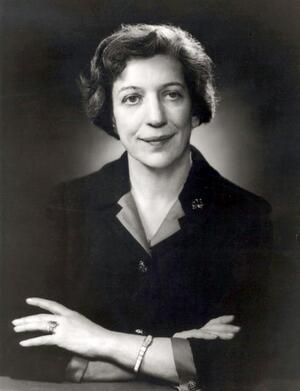Women Who Fight for Us
A fighter throughout her life for the rights of children and minorities, Justine Wise Polier was a judge of the New York City Family Court for thirty-eight years. She attributed her main goals of fighting injustice and "speaking truly… without fear" to the influence of the Hebrew prophets and her father, Rabbi Stephen Wise.
Institution: American Jewish Historical Society
November 9, 2016, 1:47 AM
I hug my mom and dad and sit motionless in front of the television, tears streaming silently down my face. Before I retreat, defeated, to my room, my mother and I lock eyes, a tacit understanding of what we just watched and what it will mean.
April 12th, 1903
An obscure though outspoken Justine Wise Polier is born, later to be confirmed as the first female judge in the state of New York.
In the late forties and early fifties, a time when many refused to listen to female voices, Polier made her voice heard. She was published in various legal journals and other opinion pieces, and never filtered her views so that others could digest them more easily. She didn’t mince words or walk on eggshells to sound more feminine. Her writing was unadulterated social criticism.
Polier understood Judaism as a call to action. Despite prejudice against her for being a Jewish woman in the public sphere, she recognized her own privilege, as I strive to do. She decided to work in the textile mills in Passaic, New Jersey in order to fully understand the injustices of factory work. Her choice to stand in solidarity with those less fortunate, rather than enjoy the comforts of the life she was endowed with, is relevant now more than ever. Should President-elect Trump follow through with his threat of a Muslim registry, many Jews and other Americans, in a solidarity move similar to Polier’s, are planning to register as Muslims.
By disguising herself as a factory worker, Polier not only showed support for those less fortunate, she made herself a target. She courageously chose to make herself vulnerable to all the discomforts the mill girls were subject to by force. She experienced their inequalities firsthand. I believe Polier’s choice is not only an inspiration, but a call to action. Polier’s life proves to me that people on this earth have a certain responsibility to one another. This responsibility compels me to act. I feel that Jews should most definitely register as Muslims if this registry materializes, as this would be a physical sign of communal strength and alliance. Polier showed deliberate care and an undying drive for effecting social change. In honoring her legacy, we must prioritize human rights over personal comfort, and attempt to effect similar change.
November 9th, 2016, 1:47 AM
The first Latina senator, Catherine Cortez Masto is voted into office. Kamala Harris, the first Indian-American senator is voted into office. Stephanie Murphy, the first Vietnamese-American senator is voted into office. Ilhan Omar, the first Somali-American Muslim woman is elected to the legislature. And, Tammy Duckworth, the second Asian American woman to be elected senator, is voted into office.
Though the highest glass ceiling still hangs suspended above us, these smaller victories, as well as Polier’s triumphant and bold story, remind me that there are women in government who will continue #fightingforus. And let’s not forget, it is our job to fight with them. As Polier wrote, “Passionate concern may lead to errors of judgment, but the lack of passion in the face of human wrong leads to spiritual bankruptcy..." We have leaders, like these women, who will work to change our world with ‘passionate concern,’ as Polier never failed to do.
At a time when the female voice was underrepresented, Polier represented us. She stood up and made the change she wanted to see. She didn’t hold the highest or most powerful office, but she didn’t watch passively as injustices were committed. I still feel her influence today, even though I hardly knew her name until recently. I know my children and grandchildren will feel the small though substantial changes made by Duckworth, Masto, Harris, Murphy, Omar and Polier, even if they never learn who these women are; but you can bet that I’ll make sure that they do.
This piece was written as part of JWA’s Rising Voices Fellowship.







